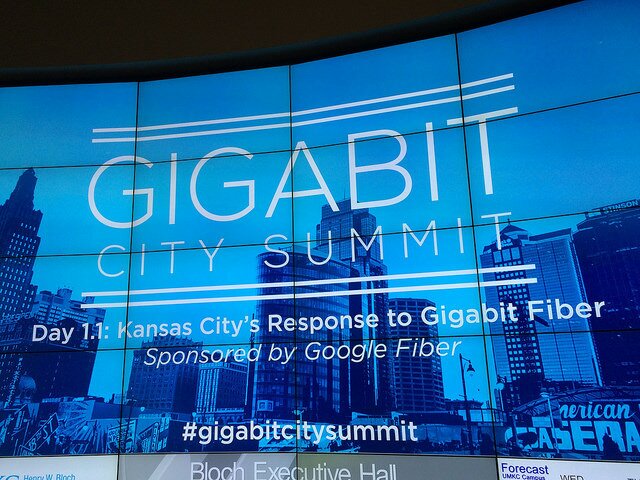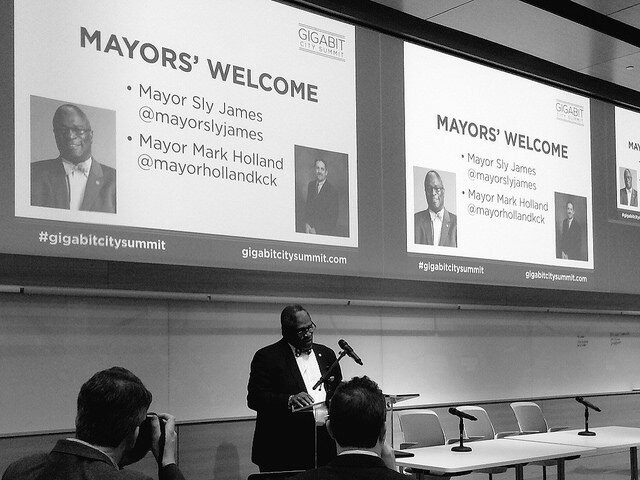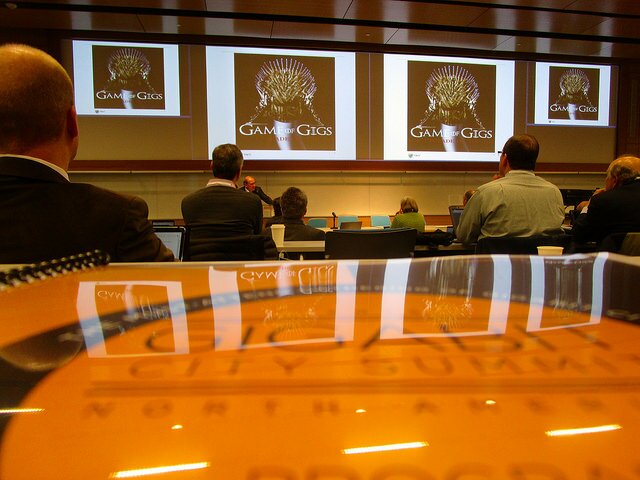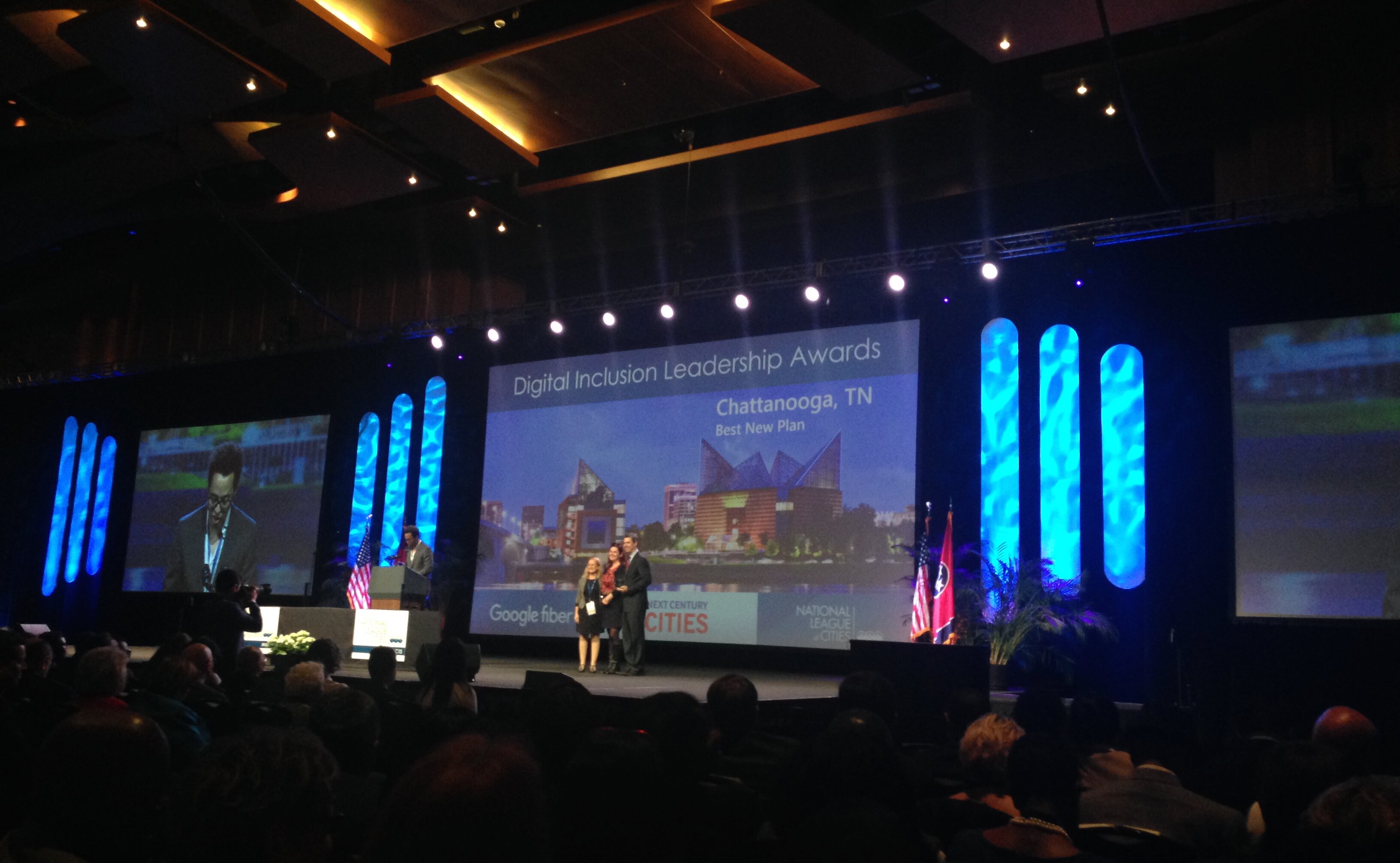Last week, I traveled with Kyla Williams, Sonja Marziano, and Christopher Whitaker to Kansas City, MO for the Gigabit City Summit – A three-day learning and networking opportunity exclusively designed for leaders in current and emerging Gigabit Cities.

Gigabit City Summit
The host city of Kansas City was chosen to be the first city with Google Fiber. Gigabit cities have internet download speeds of up to one gigabit of data per second. To compare, Chicago has an average internet download speed of 23 mbs/s. Clearly, this gives Kansas City a significant advantage.
There are many technology solutions that are limited by the bandwidth currently available in most homes and businesses. Gigabit speeds allow developers to use much more data and information to power their apps. It’s not just making Netflix load faster – there are several examples of applications that only work with gigabit speeds. This line of technological development would have huge impact into economic development as gigabit speeds would attract high tech companies.
At the other end of the spectrum, are advocates in cities who see gigabit internet as a way to close the digital divide. Gigabit internet requires substantial investment in infrastructure and the process of adding the necessary fiber lines can be a boon for digital access. This can be used for the delivery of regular Internet connections via wifi and other less speedy but still critical modes.
At Smart Chicago we care about digital access and digital skills, so we care about the city-based networks that are necessary to support people. That’s why we sent a whole delegation to Kansas City— so that we can share our model with others who toil in these fields.
We’ve got a pretty good history of this, including co-hosting a US Ignite conference in June 2013. This long-form attention is critical to our work— we don’t give up.
I was impressed with at the conference was the effort that Kansas City took to ensure they used the project to both connect every neighborhood with fiber and make serious investments into digital literacy.

Mayor Sly James of Kansas City, MO delivering the welcome at the Gigabit City Summit
In 2012, the Mayors’ Bistate Innovation Team published the playbook “Playing to win in America’s Digital Crossroads.” The team, made up of experts from both Kansas City, MO and Kansas City, KC, had begun to work on the playbook after the announcement that Kansas City would be the first metro area with Google Fiber.
Right from the beginning the playbook made digital inclusion a priority stating, “high-speed fiber can not reach it’s potential if large segments of society are excluded from it’s benefits.”
One of the ways that Kansas City is working to ensure digital inclusion is the Digital Inclusion Fund. It is housed at the Greater Kansas City Community Foundation and made possible by Google Fiber, the Sprint Foundation, The Illig Family Foundation, Polsinelli, Global Prairie and JE Dunn. In 2013, they spent $311,600 on digital literacy programs in Kansas City.
Kansas City also has programs that provide refurbished computers to low-income residents thanks to the work being done by Connecting for Good.
This one-two punch goes a long way to bridging the digital divide in Kansas City.
The story of how gigabit internet impacts education
The Gigabit City Summit also featured an education track to discuss education’s role in building a smart connected city.
For this track, the conference organizers invited teachers from the area to participate in the Summit. The group discussed STEM education, job skills, and next generation learning.
There are several apps that take advantage of gigabit speeds to help in the classroom. One of our favorite examples is the software lending library that allows Kansas City residents to use their gigabit connections to go onto the library’s servers and use commercial software like Photoshop and Microsoft Office from their home computers.
President Obama’s big push for gigabit internet
One of the big challenges with generating greater speeds and access is lack of competition among internet providers. Communities like Burlington, Vermont decided to tackle this issue by just building their own network. The city provides gigabit broadband in the same way that they provide water to residents.
Larger cable and internet companies have pushed to have laws passed in states to forbid the practice.
Last week, during the conference, the White House released a report about the benefits of community broadband solutions and the President came out in full support of net neutrality, gigabit internet, and community-based broadband solutions. President Obama also announced several federal initiatives help cities get gigabit internet including expanding grants and loans to help expand broadband internet to rural communities.Here’s the President on the issue:
Susan Crawford’s passionate call for equal access to high speed internet
The Summit’s keynote was author Susan Crawford. Crawford spoke about how access to reliable high speed internet is a social justice issue. She linked the current struggle for high speed internet for all with the electrification debates in the 1920’s and how it took federal intervention ensure that all homes were provided with electricity.
Crawford praised the President’s plan to knock down the federal regulations that make it more difficult for cities to build their own gigabit networks. She called the speech “Obama’s FDR moment” and spoke about how there is no better time to be building fiber in America.
It’s hard to capsulize Susan’s Crawford into a single blog post – so we definitely recommend checking out her book Captive Audience.
There’s more work to do
There’s a lot more work do to when it comes to ensuring every resident of Chicago has the access and skills needed to take full advantage of the power of the internet. In 2015, we’re going to be going to be launching additional initiatives to help bridge the digital divide here in Chicago. Join us!






